the destroyer > cheap papers > Drew Krewer
SCRUPLES
"I love it when you exploit your resources baby."
She was a secretary until her marriage made her one of the richest widows in the world.
Suddenly she controlled an empire of high fashion and movie-making.
Her money could buy her anything except the man she wanted most and it made her a target for blackmail and greed.
Guess what can happen when your dreams come true.
It's a game of surprising reactions, honest revelations and entertaining untruths. Play it when you feel a little scrupulous... or better yet, play it when you feel a lot unscrupulous!
Provocative discussion is the overall objective of the game. Therefore, feel free to encourage challenges and spontaneous tabletalk from all players.
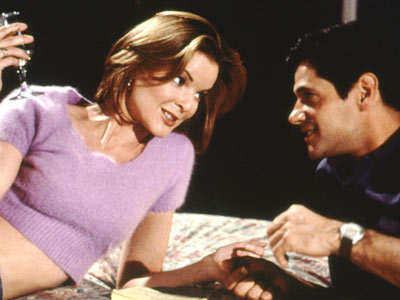
"Do you want to help me DOCTOR? Then tell me about BLACKMARKET BABIES.">>>>>>>>>>>>>>>>>>>>>>>>>>>>>
>>>>>>>>>>>>>>>>>>>>>>>>>>>>>
>>>>>>>>>>>>>>>>>
>>>>>>>>>>>
>>>>>
>>>>
Doctors are a great addition to any primetime drama. With a doctor comes illness. With a doctor as a friend, the illness comes and it tangles in every human relationship. Illness, without a doctor, is a convenient segue into something more fabulous.
Take, for instance, the 1980 mini-series Scruples, based on Judith Krantz's first novel. In it, a stunning Lindsay Wagner plays Billy Ikehorn, the heiress to an incredible fortune with which she builds an exclusive, two story, chandeliered Beverly Hills fashion boutique.
One of the first scenes shows Wagner in a helicopter above the Pacific, sloppily tossing out ashes from an heirloom silver mini-trunk. Afterward, she and the pilot take a jaunt across the parking lot of a Los Angeles motel. They make passionate love in a dingy room while drinking champagne.
During an extended flashback, we see Mr. Ikehorn, the one whose ashes eventually get a quick toss, have a stroke in a restaurant in front of the majority of the cast. He doesn't die immediately, but we see the writing on the wall.
In this scene of unexpected illness, Wagner wears a flowing, elaborate, 80s-beautiful golden dress. Because she wears it during the stroke scene, I started calling it the "stroke dress," as if it had caused her husband's health problems.

STROKE DRESS
Before Ikehorn dies, he learns to communicate with Billy by using the alphabet pieces from a really fancy version of the game Scrabble.>>>>>>>>>>>>>>>>>>>>>>>>>>>>>>>>>>>>>>>>
>>>>>>>>>>>>>>>>>>>>>>>>>>>>>>>>>>>>>>>
>>>>>>>>>>>>>>>>>>>>>>>>>>>>>>>>
>>>>>>>>>>>>>>>>>>>>>>>>
>>>>>>>>>>>>>>>>>>
>>>>>>>>>>>>>>
>>>>>>>>>>
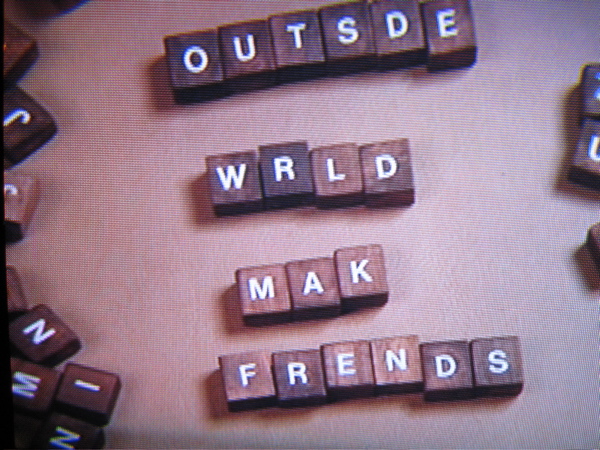
Q: Your friend works at an exclusive clothing store. Would you ask him/her to purchase merchandise for you at an employee's discount?
Only if they have giant hair bow barrettes.
Q: You've already ordered a pizza for dinner. Friends drop in and surprise you with a complete Chinese dinner. Will you still pick up the pizza?
It depends on how poor I am.
IMPORTANT: As the ANSWERING player, your reply does not have to be truthful. Your goal is to give a reply that will be different from what the ASKING player expects you to answer. Your reply whether truthful or untruthful, will be scrutinized by the other players and assessed against what they know about your character.>>>>>>>>>>>>>>>>>>>>>>>>>>>>>>>>>>>>>>>>>>
>>>>>>>>>>>>>>>>>>>>>>>>>>>>>>>>
>>>>>>>>>>>>>>>>>>>>
>>>>>>>>>>>>>
>>>>>>>>>
>>>>>>>>
*
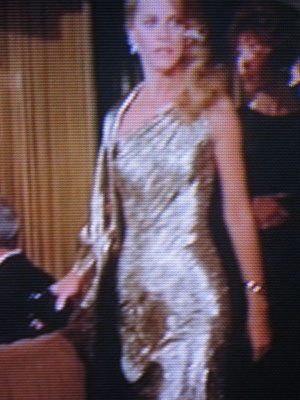
If you're my friend on Facebook, it's no newsflash that I've been trapped in Melrose Place (1992). I started watching it when I found out that I'm moving to LA in the fall. It began as a set-entrapped fantasy, and now it's just a typical show-on-Hulu obsession. The show lasts seven seasons, 226 episodes, all of which are forty minutes long (except for the specials). Once you watch enough of them, it's just a wave of cheap one liners meant to incite the affection you come to feel for certain characters.
The 90s primetime drama (and sitcom) portray the kinds of lives where friends do magically show up with an entire Chinese meal, unannounced, and afterwards, everyone goes to the apartment complex pool to play chicken with ridiculously attractive people because that's how people look in Los Angeles. Always a group of transplant friends, the majority always single, and always the possibility of fame, untimely pregnancies, and/or switched identities around the corner.>>>>>>>>>>>>>>>>>>>>>>>>>>>>>>>>>>>>>>>>>>>>>>>>>
>>>>>>>>>>>>>>>>>>>>>>>>>>>>>>>>>>>>>>>>>>>>>>>>>>>>>>>>>>
>>>>>>>>>>>>>>>>>>>>>>>>>>>>>>>>>>>>
>>>>>>>>>>>>>>>>>>>>>>
>>>>>>>>
What kind of question is that? A question from 1986, I suppose.
>>>>>>>>>>>>>>>>>>>>>>>>>>>>>>>
>>>>>>>>>>>>>>>>>>>>>>>>
>>>>>>>>>>>>>
>>>>>>
And there's usually a gay character. The gay character gets the privilege of: being beaten outside of a bar for being gay, getting fired from a job for being gay (and then somehow is re-instated back into his job due to a discrimination trial that isn't covered by the show). There's also failed relationships, closeted partners, and HIV/AIDS. If you can't portray a gay character having healthy relationships for fear of "promoting homosexuality," be safe and just give them a whole bunch of shit to deal with. The gay character of the 80s/early 90s is primarily about eliciting surface-level sympathy from the audience (while reinforcing the widespread late twentieth-century assumption that being gay places one at a distinct disadvantage in life).
There's also usually someone who is in the FASHION industry.>>>>>>>>>>>>>>>>>>>>>>>>>>>>>>>>>>>
>>>>>>>>>>>>>>>>>>>>>>>>>>>>>>
>>>>>>>>>>>>>>>>>>>>>>>
>>>>>>>>>>>>>>>>>
>>>>>>>>>>>
>>>>>>
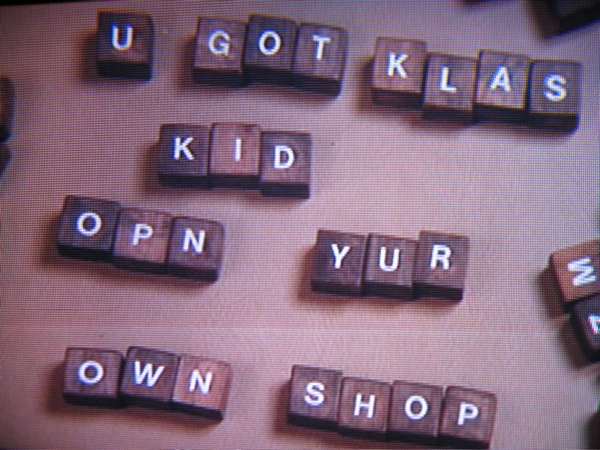
Mr. Ikehorn speaks again.
If only his wife weren't into fashion, specifically gold dresses, he wouldn't have to Scrabble out a statement demanding that his wife open a boutique.
Are these lives desirable? The life of the heiress who attends the Cannes film festival to find her replacement husband after scattering her former husband's ashes haphazardly over the waves? What about the desirability of being a transplant with trendy friends who drink at one neighborhood bar, one coffee shop (Friends, anyone?), and have dinner parties and game nights that end in someone's feelings being pounded out flatly and fed through a shredder?>>>>>>>>>>>>>>>>>>>>>>>>>>>>>>>>>>>>>>>>>>>>
>>>>>>>>>>>>>>>>>>>>>>>>>>>>>>
>>>>>>>>>>>>>>>>>>>>>>>>
>>>>>>>>>>>>>>>>
>>>>>>>>>>
>>>>>>>>
I remember advertisements for the Scruples mini-series airing in the mid to late 80s, which is odd, since IMDB reveals that the series originally aired February 25, 1980, a good three years prior to my birth. At this point, I begin to really question the validity of my memory. I also remembered commercials for a Milton Bradley "adult conversation game" called Scruples being aired around this time. Did the series re-air as a cross-promotion of the Krantz book and the newly developed board game? Did I see the advertisement of the board game and find Scruples on my mother's bookshelf? Did it have "Now a Television Mini-Series" on the front?
I came across a used Scruples game in Bookman's, a Buffalo Exchange for books, and I bought it based on amorphous recollections of advertisements I had seen roughly twenty-four years ago. If that doesn't say something about the power of advertising, I don't know what does.
The advertisement for the Scruples party game, come to find out, is oddly misogynistic:
Friend: Your girlfriend is allergic to your dog. She says the dog goes or she goes. Do you give up the dog?
80s Bro: Man's best friend... are you nuts?
Friend #2: You'd pick your mutt over your girl?
80s Bro: Hey, that mutt's been bringing me my slippers for two years. I think that's a long term relationship.
Friend #3: Why don't you get a dog house?
80s Bro: I would, but I don't think she'd sleep in it.
>>>>>>>>>>>>>>>>>>>>>>>>>>>>>>>>>>>>>>>>>>>>
>>>>>>>>>>>>>>>>>>>>>>>>>>>>>>
>>>>>>>>>>>>>>>>>>>>>>
>>>>>>>>>>>
Depends on many factors. I'm thinking I'd be more likely to think it the guest's responsibility to admit to breaking the chair.
Q: You are really attracted to someone you meet at a party. Later the same evening, the special person suggests spending the night together. Do you agree?
No. I'm way turned off by one-night propositions.

"Put a leash on your boyfriend.">>>>>>>>>>>>>>>>>>>>>>>>>>>>
>>>>>>>>>>>>>>>>>>>>>>>>>
>>>>>>>>>>>>>>>>>>
>>>>>>>>>
>>>>>>>

Sure, I'll go to the party, Mr. Ikehorn. But what should I wear?
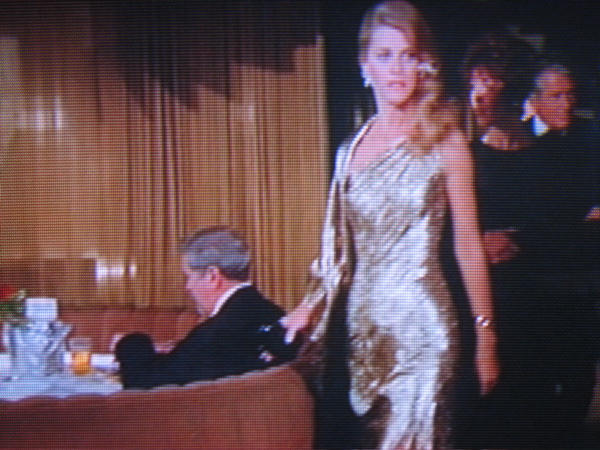
Ruthlessly, killingly beautiful.
"If you looked any more decent, you'd be indecent."
Having lived in Tucson for five years, I have had my share of desert parties. The draw for me to attend parties, I have found, is the desire to alternate between both being known and being lost. Now, when I attend parties, I rarely get lost. I've been trying to think of reasons why my interest in Tucson parties has dwindled, and this is the only explanation that seems plausible to me. The fact Tucson is small and lacking a certain degree of anonymity. It might also have something to do with me nearing thirty and focusing on a career.
As I look to September and my arrival in California, I am wondering what, exactly, an LA party will look like. With this move, having never actually been to Los Angeles, I realize the only thing I know about the city is what I've learned from television and movies. I know about rich people and transplanted singles.
I guess what all of these television memories make me realize is that I want to create my own LA. While driving around the cityscape, I want to feel like I'm both in an 80s Beverly Hills movie AND in my own version of things. If I can't escape the advertisements from long ago, surely I can't escape the elaborate fantasy LA that I've whipped up in my brain over the years? What happens when media-fabricated and lived experience suddenly collide? Will I start to answer questions the way they do in Scruples and Melrose?:
"It doesn't speak to you?"
It doesn't even whisper.








